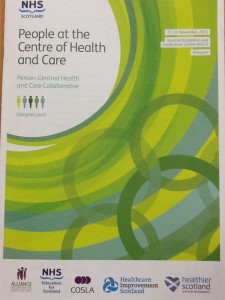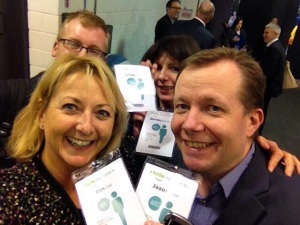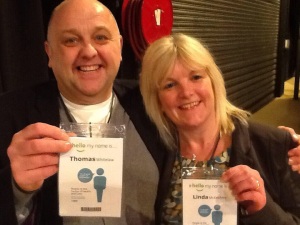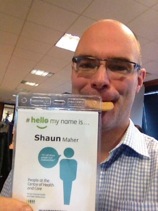a few weeks back I had the great privilege to speak at the Person Centered Scotland learning collaborative
at the SECC in Glasgow
along with having the great honor to speak at the event i met so many inspiring kind people
so thank you NHSD&G for the kind words within your on - line article looking back at the event
thank you for the #kindness
you can view the whole article at the link here http://dghealth.wordpress.com/
“Learn a single trick” by @personcntrdDG
 On November 21 -22 2013 a delegation from NHS Dumfries and Galloway attended the third Learning session on People at the Centre of Health and Care at the SECC in Glasgow.
On November 21 -22 2013 a delegation from NHS Dumfries and Galloway attended the third Learning session on People at the Centre of Health and Care at the SECC in Glasgow.
This blog is an amalgamation of thoughts and experiences from that group of nurses, managers, doctors, carers and social and third sector workers who attended the two days and hopefully will provide you with some insight into what proved to be a very interesting and thought provoking learning session.
One of the themes of the two days was #hellomynameis. For those of you not familiar with Twitter the # sets a trend and this particular one was started by a young doctor called Kate Granger. Along with being a junior doctor and accomplished author Kate has terminal cancer and writes eloquently about her disease and experiences on her blog and twitter. Earlier this year Kate was admitted to hospital and she noticed that not everybody introduced themselves. She writes about this on her blog and we would recommend reading it here. The upshot was her campaign to ensure that every encounter between healthcare professional and service user started with ‘hello my name is…’ and this quote, complete with #, was put on every delegates name badge – along with the request to take ‘selfies’ (a picture of oneself taken with a smartphone)and post them on twitter. Some examples can be seen here.
reading it here. The upshot was her campaign to ensure that every encounter between healthcare professional and service user started with ‘hello my name is…’ and this quote, complete with #, was put on every delegates name badge – along with the request to take ‘selfies’ (a picture of oneself taken with a smartphone)and post them on twitter. Some examples can be seen here.
 reading it here. The upshot was her campaign to ensure that every encounter between healthcare professional and service user started with ‘hello my name is…’ and this quote, complete with #, was put on every delegates name badge – along with the request to take ‘selfies’ (a picture of oneself taken with a smartphone)and post them on twitter. Some examples can be seen here.
reading it here. The upshot was her campaign to ensure that every encounter between healthcare professional and service user started with ‘hello my name is…’ and this quote, complete with #, was put on every delegates name badge – along with the request to take ‘selfies’ (a picture of oneself taken with a smartphone)and post them on twitter. Some examples can be seen here.
 Although the title of the event suggests a focus on patients and service users we would like to stress that staff experience, staff support and staff values are recognised as being equally important and there were several workshops to this effect. If your workforce are unhappy and feel poorly supported then your patients experience will consequently suffer.
Although the title of the event suggests a focus on patients and service users we would like to stress that staff experience, staff support and staff values are recognised as being equally important and there were several workshops to this effect. If your workforce are unhappy and feel poorly supported then your patients experience will consequently suffer.
At the core of the Person Centred Collaborative are the 5 “Must do with me” elements. These are:
- What matters to you?
- Who matters to you?
- What information do you need?
- Nothing about me without me
- Personalised contact
Throughout the two days we were asked to focus on these elements and consider improvement plans to take back to our workplace based upon them. We shall list a few from Dumfries and Galloway later in this blog but for now here are some of the highlights…..
Tommy Whitelaw – Tommys mother died following a 6 year fight against progressive dementia and throughout this time he was her main carer. Tommy delivered an extremely moving speech highlighting how some small acts of kindness can make all the difference and unfortunately that lack of kindness can have such a negative impact. He speaks best for himself and his videos can (and should) be viewed here. There not many events like this where a speaker gets a 5 minute standing ovation.
‘F for frailty’ – a workshop focusing on the Comprehensive Geriatric Assessment (CGA). This tool is used in the Emergency Department and has proved very successful in reducing elderly care admissions. One hospital reported a reduction of admission by one third using this tool, which has a very person centred approach.
Staff experience – a number of workshops focused on this. Supporting our staff to ensure they can come to work safe, confident and able to offer care compassion and respect to their patients and then go home with a sense of worth and value is vital to ensuring that we are delivering person centred care. One tool to support this is Values Based Reflective Practice (VBRP). VBRP offers a safe environment for a team to discuss difficult cases in a non-judgemental or accusatory way. No blame is apportioned and no ‘solution’ expected. This is evidence based and can significantly improve staff well-being and morale. We will be starting a course of VBRP training sessions in the New Year so watch out for adverts and emails offering places.
Visiting – this is a controversial area. Strict visiting hours and not always in the patient or families best interests but are felt historically necessary to protect them. There were two lively debates around relaxing visiting hours and moving to more person centred visiting ‘contract’ which felt very positive. If we wish to deliver this in DGRI then we need to involve staff in its implementation and we plan to do so early next year.
Teachback – This is a tool which is used to ensure that a patient has understood what you have been telling them. Some concerns were raised that doing this with every patient would make clinics unbearably long. However the counter argument was that taking 2 minutes to ensure understanding would save time in the future when it became clear that patients didn’t understand and required a further clinic appointment etc. In this workshop there was also a discussion about ‘going Italian’ which essentially meant encouraging families to attend clinic appointments with loved ones to help with both understanding and difficult decision making.
Leadership – our very own Hazel Borland led a workshop where she described her experiences of putting on her nursing uniform and doing a shift ‘back at the coal-face’. Hazel does this once a month and freely admits that it is important to her but has found that it matters to the staff as well. There was quite a buzz around this workshop and I heard several clinical leaders planning to do likewise on return to work.
Another powerful moment was when we were shown a youtube video of Dartmouth Childrens Hospital performing Katy Perrys ‘Roar’. This was extremely moving and in case you are wondering why it was included its because of the the lyric “I am the champion and you’re going to hear me Roar.” You can watch it here, which we strongly recommend.
The team returned with many plans to improve services in Dumfries and Galloway including; the use of ‘Getting to know me’ booklets for every referral to the social care hub, a change to visiting hours (from visiting to welcoming), a neonatal passport, training in VBRP, further enhanced patient experience events and many, many more.
A final point is that we now have a Person Centred Health and Care Committee which reports to the Board and will be the driving force behind many of the improvement plans mentioned above.
This is a brief summary of some of the excellent work experienced by the person centred team from Dumfries and Galloway. It would be an understatement to say that we all came away enthused, excited and keen to get working on improvement. The key message is that when we are considering any changes to service we need to not only think of the service user but include them in the decision and continually be asking the question “What matters to you?” We are doing some great work but more needs to done – change is clearly ahead.
that when we are considering any changes to service we need to not only think of the service user but include them in the decision and continually be asking the question “What matters to you?” We are doing some great work but more needs to done – change is clearly ahead.
 that when we are considering any changes to service we need to not only think of the service user but include them in the decision and continually be asking the question “What matters to you?” We are doing some great work but more needs to done – change is clearly ahead.
that when we are considering any changes to service we need to not only think of the service user but include them in the decision and continually be asking the question “What matters to you?” We are doing some great work but more needs to done – change is clearly ahead.

